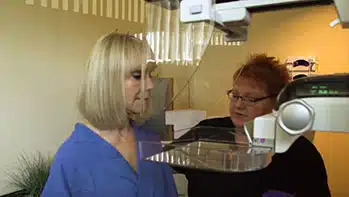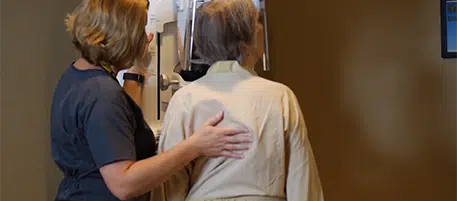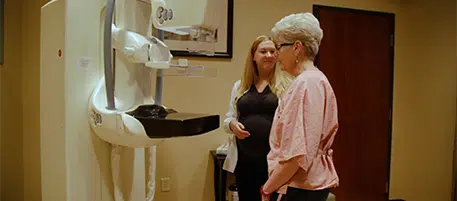Mammography
Regular mammograms can help find breast cancer at an early stage, when treatment is most likely to be successful. A mammogram can find breast cancer years before physical symptoms develop.
Results from many decades of research clearly show that women who have regular mammograms are more likely to have breast cancer detected early when it’s most treatable and less likely to require aggressive treatment such as surgery to remove the entire breast (mastectomy) and chemotherapy.
A referral is not required for a screening mammogram.
If your screening mammogram is inconclusive, a diagnostic mammogram will be ordered to assist in the diagnostic process. If you are experiencing any breast abnormalities such as nipple pain, discharge, or feel a lump, or if you have had breast cancer in the past, your doctor may order a diagnostic mammogram. Unlike with screening mammograms, a radiologist will be on hand to immediately interpret the mammogram results. The radiologist may order additional imaging or a biopsy to confirm findings.
What You Need To Know
- An annual screening mammogram is recommended for women beginning at the age of 40, according to the American College of Radiology (ACR) and the Society of Breast Imaging (SBI). The American Cancer Society also recommends that women have the choice to begin mammography screening at age 40.
- We encourage you to talk with your provider to find out what’s best for you.
- Mammograms are a type of X-ray exam that expose the breasts to small amounts of radiation. Experts agree that the benefit of finding a potential cancer early outweigh any possible harm from the radiation exposure.
- Radiation is something that naturally occurs in our environment. The dose of radiation used for a screening mammogram of both breasts is about the same amount of radiation a woman would get from her natural surroundings over about seven weeks.
What To Expect
- We’ll give you a call before your appointment to talk through preparation instructions.
- Please provide the name, address and phone number of any facility where you have had a prior mammogram. If you have images from previous exams, please bring them to your appointment. Our radiologist may need these prior images for comparison in order to make an accurate diagnosis.
- Be sure to tell us if you are pregnant, nursing, or if there is a chance you may be pregnant.
- On the day of your exam, please arrive 15 minutes early for check-in.
- A technologist will greet you and will go over a few health questions.
- You will be led to a dressing room to remove your shirt and bra and put on a robe or gown that we provide for your exam.
- Your technologist will escort you to the mammogram suite and will position you in front of the machine.
- One at a time, your breasts will be carefully positioned between the adjustable platform and clear plate. You will feel brief pressure as the plate flattens the breast tissue to get the clearest image possible.
- When your scan is complete, you’ll be escorted back to the changing room so you can change out of the scrubs and back into your clothing.
- Once you have changed, your appointment is complete. You do not need to check out with the front desk when you leave.
- After the exam, your images will be sent electronically to a radiologist who will review the information and send a report to your referring provider.
- If additional images are recommended, you will receive a phone call from our staff within 24-48 business hours to schedule a follow-up appointment.
- You should follow up with your referring provider to discuss your results.
- Many states have passed laws, or are in the process of passing laws, requiring mammography centers to notify women about their level of breast density after they have had a mammogram. Breast density is determined by the radiologist interpreting the mammogram and does not necessarily correlate with the look or feel of the breasts. A radiologist reviewing a mammogram may assign a breast density score on a 4-level scale and include it in your mammography report.

 What every woman needs to know about mammograms as you age
What every woman needs to know about mammograms as you age  Is it OK to skip my mammogram?
Is it OK to skip my mammogram?  Changing mammogram guidelines
Changing mammogram guidelines